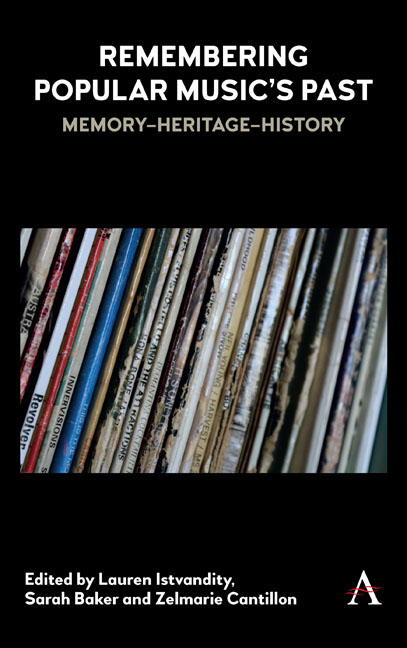Book contents
- Frontmatter
- Contents
- List of Figures
- Acknowledgements
- Chapter 1 The Precarity of Memory, Heritage and History in Remembering Popular Music's Past
- Part I MEMORY
- Part II HERITAGE
- Part III HISTORY
- Chapter 12 Jim Jarmusch's Mystery Train (1989): Representing the Memphis Music Legacy on Film
- Chapter 13 Phenomenology of the Surf Ballroom's Winter Dance Party: Affect and Community at a Popular Music Heritage Tourism Event
- Chapter 14 Disappearing History: Two Case Studies on the Precarity of Music Writing
- Chapter 15 Great Albums, Greedy Collectors and Gritty Sounds? A View from ‘Snobbish Connoisseurs’ on the Canonization and Archivalism of Korean Pop-Rock
- Chapter 16 Towards a Feminist History of Popular Music: Re-examining Writing on Musicians and Domestic Violence in the Wake of #MeToo
- List of Contributors
- Index
Chapter 16 - Towards a Feminist History of Popular Music: Re-examining Writing on Musicians and Domestic Violence in the Wake of #MeToo
from Part III - HISTORY
Published online by Cambridge University Press: 09 July 2019
- Frontmatter
- Contents
- List of Figures
- Acknowledgements
- Chapter 1 The Precarity of Memory, Heritage and History in Remembering Popular Music's Past
- Part I MEMORY
- Part II HERITAGE
- Part III HISTORY
- Chapter 12 Jim Jarmusch's Mystery Train (1989): Representing the Memphis Music Legacy on Film
- Chapter 13 Phenomenology of the Surf Ballroom's Winter Dance Party: Affect and Community at a Popular Music Heritage Tourism Event
- Chapter 14 Disappearing History: Two Case Studies on the Precarity of Music Writing
- Chapter 15 Great Albums, Greedy Collectors and Gritty Sounds? A View from ‘Snobbish Connoisseurs’ on the Canonization and Archivalism of Korean Pop-Rock
- Chapter 16 Towards a Feminist History of Popular Music: Re-examining Writing on Musicians and Domestic Violence in the Wake of #MeToo
- List of Contributors
- Index
Summary
In 2017, in the wake of allegations of sexual assault against movie mogul Harvey Weinstein, women, trans-and gender diverse persons1 across the creative industries (and beyond) have come forward to shed light on the prevalence of sexual assault and violence in these areas. The #MeToo hashtag, which was used extensively on social media from late 2017 when stories were being shared online as a way of demonstrating the widespread nature of sexual assault and abuse, has become emblematic of this moment. As part of this, women have been taking collective action to draw attention to the pervasiveness of this type of abuse in the music industries. For example, over 2,000 people in Sweden (Dagens Nyheter 2017) and over 1,000 in Australia (The Industry Observer n.d.) have signed open letters detailing the types of abuse they have been subjected to, and calling for change and an end to such behaviour. The Swedish letter stated that:
In the music industry we work 24/ 7, often with insecure contracts and temporary employment. Being accommodating and not making a fuss is important in order to not be replaced. This makes women in the music industries targets of power demonstrations, often with a sexual nature. In our existence laws on consent are far away, we are objectified and sexual assault and harassment are more rule than exception. (Dagens Nyheter 2017)
Reading the stories shared in these open letters gives powerful insight into how the culture of the industry encourages mistreatment of women and minimizes their experiences. For example, one contributor noted:
When a competent male musician rapes you, you lose a lot of friends. ‘What he did was wrong. But he is an asset to the music industry so we don't want to lose him. I hope you can understand and respect that.’ One example of what friends have said when I've told them what happened. (Dagens Nyheter 2017)
The stories in these letters, and others that emerged during this time through social media and other forums, have made it clear that abuse is often normalized in the music industries. This new –but not new –knowledge raises questions about the extent to which such behaviours have always been part of popular music, and how histories of this music are often written so as to ignore, excuse or even valorize such misdeeds.
- Type
- Chapter
- Information
- Remembering Popular Music's PastMemory-Heritage-History, pp. 217 - 232Publisher: Anthem PressPrint publication year: 2019

